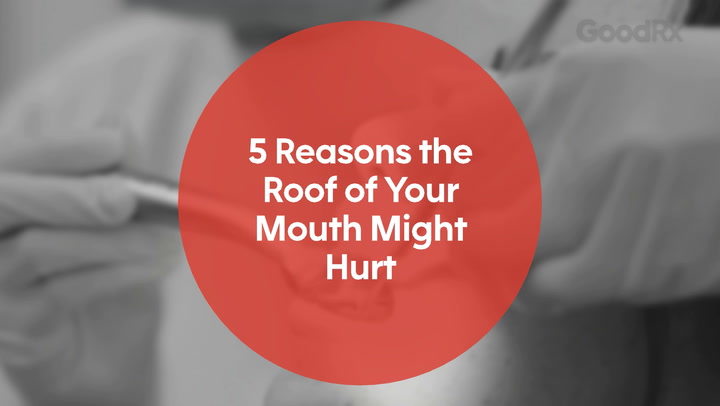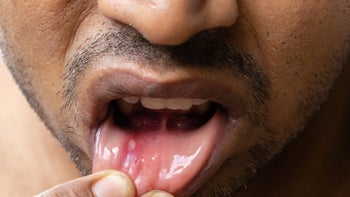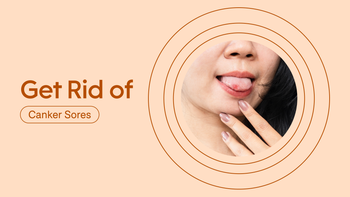
Canker Sore Treatment: A Guide to Prescription Medications and Home Remedies
Key takeaways:
Canker sores are shallow, painful ulcers that can appear in your mouth.
There are many prescription and over-the-counter (OTC) medications that treat canker sores. These treatments can help relieve pain and speed up healing.
There’s no way to get rid of canker sores quickly. But home remedies and OTC options, like numbing gels and coating agents, can provide quick pain relief.
Access savings on related medications

If you’ve ever had a canker sore, you know how painful they can be. Depending on its size and location, a canker sore can make it hard to eat, drink, and even speak. It’s no surprise that people are often searching for canker sore treatment options.
There’s no way to quickly get rid of a canker sore. But you’ll be relieved to know that there are canker sore medications that can help you feel more comfortable.
What is a canker sore (aphthous ulcer)?
A canker sore is a shallow ulcer that forms on the inside of your mouth. Canker sores are also called “aphthous ulcers” or “Mikulicz ulcers.”
Most canker sores are:
Round or oval in shape
White or yellow in color
Small (though they can get up to a centimeter or more in size)
Solitary (though some people can get several at once)
In the U.S., 1 in 5 people will experience canker sores. People usually develop their first canker sore during their teen years. And while you can continue to get canker sores throughout your life, most people have fewer episodes as they get older.
What medications can get rid of canker sores?
Medications for canker sores won’t work instantaneously. But there are many aphthous ulcer medications you can use to relieve your symptoms and speed up healing. Some canker sore medications are available by prescription, while others are available over the counter (OTC).
Prescription canker sore medications
People who get a large canker sore — or many at once — may need prescription canker sore medications. That’s because pain can be so severe that people aren’t able to eat or drink, and that can lead to dehydration. Even if that isn’t the case for you, you can still talk to a healthcare professional about trying some of these canker sore medications. Some of the most common options include:
Viscous lidocaine: Viscous lidocaine 2% is the most commonly used prescription canker sore medication. It works by numbing the area in your mouth so that you don’t feel pain from the canker sore. It comes as a gel that you can apply directly to your sore. If you have many sores, you can also use it as a rinse. You should never swallow viscous lidocaine — so it’s not a good option for younger children.
Coating medications: These are liquids that you swish around your mouth and then spit out, like you do with mouthwash. Popular options include sucralfate and attapulgite suspension. Studies show that sucralfate shortens canker sore healing time and provides pain relief.
Topical disinfectants: People with more severe canker sores may need topical disinfectants to prevent infections. Popular options for these canker sore medicines include carbamate peroxide (Gly-Oxide), chlorhexidine gluconate, and silver nitrate. Some research shows that these medications provide pain relief and speed up healing.
Steroids: Another option for people with more severe canker sores are steroids. Steroids help lower the immune system response, which can help inflammation and pain. Steroids come in liquid and gel form that you can apply directly to your canker sores, or use as a rinse. Options include triamcinolone acetonide 0.1% paste, clobetasol 0.05% gel or ointment, and fluocinonide gel. Studies show steroids can speed up healing and help with pain.
Over-the-counter canker sore medicines and remedies
There are also many OTC canker sore medicines. If you only get one or two small sores at a time, these options may be enough to provide pain relief. Popular options include:
Topical numbing medications: Benzocaine and lidocaine are numbing medications that come as a gel or liquid. You can apply them directly to your canker sore and they will numb the area and provide pain relief. Both of these medications are available OTC at pharmacies.
Coating agents: Just like the prescription kind, these are liquids that you swish around your mouth and then spit out. These medications coat your canker sore, provide pain relief, and speed up healing time. Popular OTC options include bismuth subsalicylate, milk of magnesia (magnesium hydroxide), and Mylanta (aluminum hydroxide / magnesium hydroxide / simethicone) suspension. Use about 5 mL to 10 mL at a time. You can use them several times a day for ongoing relief. Make sure you don’t swallow these medications.
Lozenges: Dyclonine lozenges are another type of coating medication. As the lozenge dissolves slowly in your mouth, it coats your canker sore and provides pain relief.
Canker sore covers: Canker sore covers are dissolvable patches you place over your canker sore. There’s some evidence that these can speed up healing and provide pain relief.
Topical hyaluronic acid: Topical hyaluronic acid is a gel that you apply to your canker sore. There are some small studies that show it works just as well as prescription steroids for pain relief and healing.
Home remedies for canker sores
In addition to medications, there are a few canker sore remedies you could try at home.
Honey
Honey has some antibacterial properties so it can help with healing. It’s also thick so it works well as a natural coating agent. The coating can protect your canker sore from irritation while it heals.
Salt water rinses
Rinsing with salt water can help relieve pain from canker sores. Mix a tablespoon of salt in a glass of warm water, and swish a mouthful around for about 15 seconds. Make sure you spit out the salt water. You can try this as many times a day as you need for pain relief.
Good dental hygiene
Continue your usual dental care even though it might hurt. Good oral hygiene will help the healing process. To decrease pain from dental hygiene you can try a soft bristle toothbrush and waxed dental floss. Make sure to use a non-alcohol-based mouthwash. And make sure your toothpaste doesn’t contain sodium lauryl sulfate. There’s some evidence this ingredient may actually worsen cold sores.
Hydrogen peroxide
Mix hydrogen peroxide equally with water and dab the mixture on your canker sore using a Q-tip or cotton swab. Then, put a small amount of milk of magnesia on your canker sore to coat it. You can do this four times a day to help with healing and pain.
B12 supplements
Some small studies show that B12 supplements can help speed up canker sore healing — even if you don’t have a B12 deficiency. Try adding a B12 supplement to your daily routine. B12 supplements are available at retail pharmacies, grocery stores, and health food stores.
Avoid irritating food and drinks
Some foods and beverages can cause more irritation and pain. Avoid spicy foods, citrus, and coffee. These things can aggravate your canker sore.
Can a canker sore heal on its own?
Yes. Canker sores heal on their own in about 1 or 2 weeks. Though medications can help with pain, there’s nothing you can do to get a canker sore to heal immediately. If you aren’t comfortable using medications, you don’t have to. There are at-home remedies to try, or you can simply wait and let your body heal the canker sore.
What causes canker sores?
Even though canker sores are very common, they’re still a bit of a mystery. It’s not really clear why people get them. Researchers have proven that infection doesn’t cause canker sores. There’s some evidence that the immune system and genetics play a role.
You can also develop a canker sore because of:
Trauma (like biting the inside of your mouth)
Stress
Medications that lower your white blood cell count
Most of the time, canker sores aren’t serious. But sometimes they can be a symptom of another illness, including:
Periodic fever, aphthous stomatitis, pharyngitis, adenitis syndrome or PFAPA
If you get frequent, multiple, or large canker sores, talk to your healthcare professional about getting an evaluation for these medical conditions.
The bottom line
Canker sores are painful mouth ulcers that take between 1 and 2 weeks to heal. Luckily, there are many prescription and OTC medications that speed up healing and reduce pain. At-home canker sore treatments, like salt water rinses and avoiding certain types of foods and drinks, can also help keep you comfortable.
Why trust our experts?


References
Ada Health. (2022). Aphthous mouth ulcers.
Al-Maweri, S. A., et al. (2021). Efficacy of hyaluronic acid for recurrent aphthous stomatitis: A systematic review of clinical trials. Clinical Oral Investigations.
Chattopadhyay, A., et al. (2007). Risk indicators for recurrent aphthous ulcers among adults in the US. Community Dentistry and Oral Epidemiology.
Edgar, N. R., et al. (2017). Recurrent aphthous stomatitis: A review. Journal of Clinical and Aesthetic Dermatology.
EurekAlert! (2007). CankerMelts patches reduce pain and speed resolution of canker sores.
Herlofson, B., et al. (1994). Sodium lauryl sulfate and recurrent aphthous ulcers. A preliminary study. Acta Odontologica Scandinavica.
Liu, C., et al. (2012). Efficacy and safety of dexamethasone ointment on recurrent aphthous ulceration. American Journal of Medicine.
MedlinePlus. (2023). Canker sore.
Miles, D. A., et al. (1993). Triamcinolone acetonide versus chlorhexidine for treatment of recurrent stomatitis. Oral Surgery, Oral Medicine, and Oral Pathology.
Plewa, M. C., et al. (2023). Aphthous stomatitis. StatPearls.
Prestige Consumer Healthcare. (n.d.). Gly-Oxide® antiseptic oral cleanser.
Rostas, A., et al. (1978). Management of recurrent aphthous stomatitis. A review. Cutis.
Slebioda, Z., et al. (2014). Etiopathogenesis of recurrent aphthous stomatitis and the role of immunologic aspects: Literature review. Archivum Immunologiae et Therapiae Experimentalis.
Soylu Özler, G. (2014). Silver nitrate cauterization: A treatment option for aphthous stomatitis. Journal of Cranio-Maxillo-Facial Surgery.
Soylu Özler, G., et al. (2014). The efficacy of sucralfate and chlorhexidine as an oral rinse in patients with recurrent aphthous stomatitis. Advances in Medicine.
Suresh, R., et al. (2017). Honey for recurrent minor aphthous ulcers; foundations for an online initiative. Psoriasis and Atopic Dermatitis.
Volkov, I., et al. (2009). Effectiveness of vitamin B12 in treating recurrent aphthous stomatitis: A randomized, double-blind, placebo-controlled trial. Journal of the American Board of Family Medicine.








